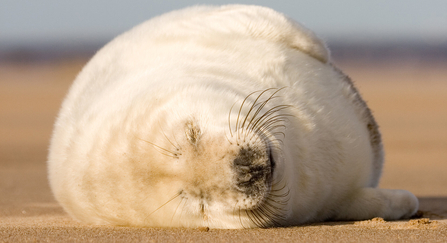Joint Project: Creating a Pipeline for Marine Biodiversity Net Gain
We are in the process of creating a project pipeline for Marine Net Gain as part of a joint research project we’re working on. Marine Net Gain refers to a piece of policy that will (once in place) require any marine based developments to avoid residual loss to the environment, minimise and mitigate where possible, offset any final residual loss AND go beyond this to provide a ‘net gain’ for the environment. The aim of this policy is to ensure that the marine environment is put into recovery. Jasmine and I have been investigating the types of projects that could be implemented to ensure our ocean is put into recovery, with a particular focus around the North Sea.
Within this project, we have had the opportunity to meet people working within varying sectors of marine industry, and it has been a great way to investigate innovative methods people are using to restore the marine environment.
Sian’s Individual Project: Hydrogen Energy Production – An Awareness and Perceptions Study of the Marine Implications
As is set out in the British Energy Security Plan, the Government sees low-carbon hydrogen as an essential energy source in order to reach our net zero target by 2050 (British Energy Security Plan, 2021). Hydrogen energy has the potential to decarbonise our energy system, and more specifically is being considered as an opportunity to decarbonise the transport industry. Hydrogen is created by splitting other components (e.g. water). A ‘twin track’ approach to hydrogen production may be required to meet net zero targets. What this means, is producing a combination of both electrolytic ‘green’ hydrogen, and CCUS-enabled ‘blue’ hydrogen (UK Hydrogen Strategy, 2021).
The purpose of my project is to gain a better understanding of the production methods required to create both green and blue hydrogen, and in turn the impacts they may have on the marine environment. In order to do this, I created a survey which was completed by those working within marine industries and environmental groups, to understand what the perceived impacts are, and I will be completing a literature review to investigate these impacts!
Jasmine’s Individual Project: CCUS - A Review into the Global Approach
A smaller proportion of our workload goes towards our individual projects, but each topic area is just as important and current as our main project! CCUS refers to Carbon Capture Utilisation and Storage. Carbon capture involves either the capture of CO2 from large emission sources, like industrial facilities or power generation, or directly from the atmosphere. The captured CO2 is then transported and stored safely underground, or utilised in vital sectors like cement, steel, fertilisers and to produce clean hydrogen.
To capture CO2 from these large emission sources, they can be equipped with technology to prevent any carbon dioxide being emitted into the atmosphere. To remove CO2 directly from the atmosphere, there’s 2 methods: using direct air capture and storage (DACCS) or bioenergy with capture and storage (BECCS). CCUS will play a key role in meeting the UK’s net zero carbon emissions target by 2050.
At the end of my project, I’ll have completed a literature review into the global approach of carbon capture. I released a survey to investigate if there are any knowledge gaps surrounding CCUS, and I’ll use the data from this to assess if knowledge is up to date within our partner organisations. The use of carbon capture has really accelerated in the last few years, so it has been a great topic to work on!
National Mammal Week
I thought it would be nice to finish the blog by highlighting that it’s National Mammal Week. With their ‘pupping season’ approaching in November, it’s also a great opportunity to put the spotlight one of Lincolnshire’s most famous marine mammals, the grey seal. Each year from November to January, grey seals gather in the thousands at Donna Nook to give birth. With over 2,000 pups born last year, it really is a sight to behold! If you have the opportunity to visit Donna Nook during the pupping season, it is definitely a worthwhile visit, but please remember to be mindful of the wildlife and keep a safe distance, staying on the public footpaths and listening to the wardens and volunteers who are helping to keep the seals safe.
Sian



